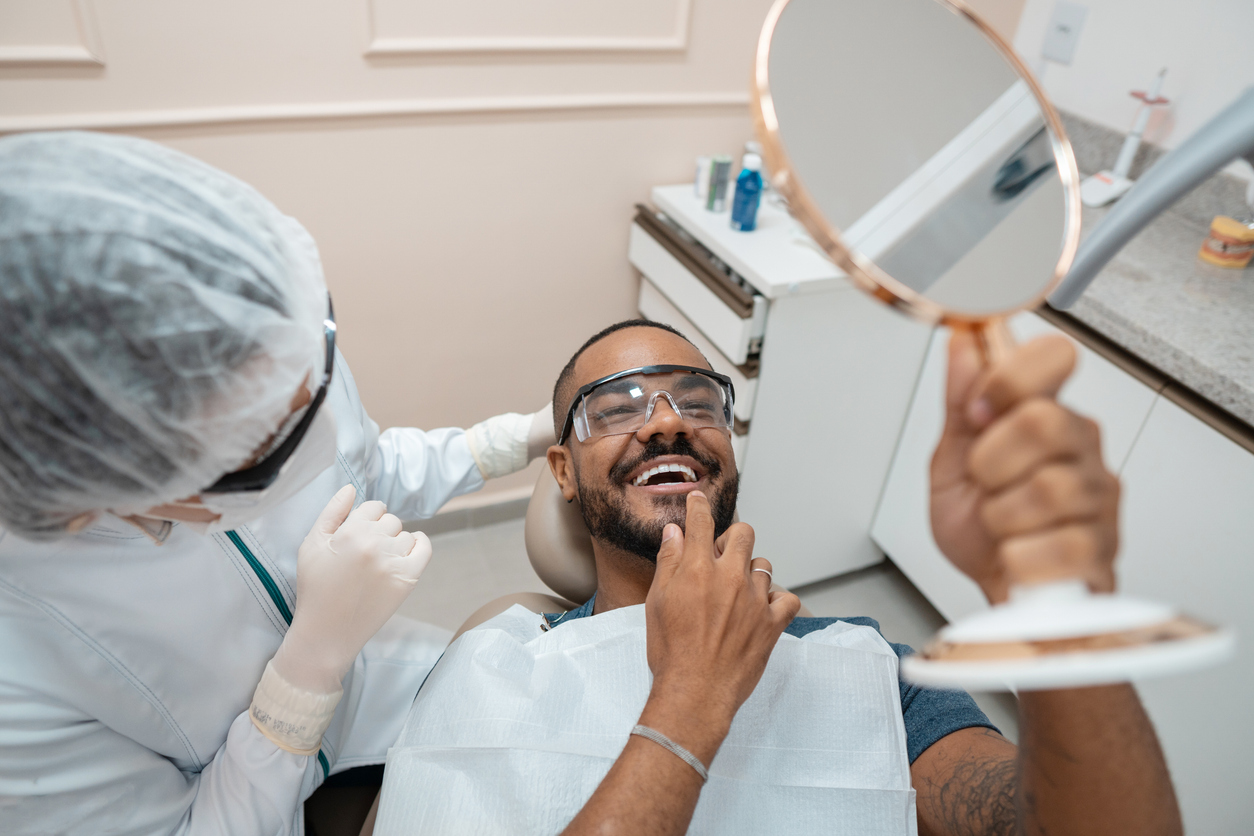Dental anxiety is a pervasive issue that affects millions of people worldwide, often preventing them from seeking essential periodontal care. At Arizona Periodontal Group in Phoenix, AZ, Dr. Trujillo and our team understand that fear of dental visits, pain during procedures, or the cost of treatments can create significant barriers to maintaining optimal oral health. This blog post dives deep into the roots of dental anxiety, offers unique insights into managing it, and provides actionable coping strategies to ensure your dental visits are as stress-free as possible. Whether you’re hesitant about a routine periodontal procedure or one that is more complex, we’re here to guide you toward a calmer, more confident dental experience.
Understanding Dental Anxiety: More Than Just Nerves
Dental anxiety isn’t just feeling nervous before an appointment—it’s a complex emotional and physiological response that can range from mild unease to debilitating fear. Studies suggest that up to 20% of adults experience moderate to severe dental anxiety, with some avoiding dental care altogether. For periodontal patients, this fear can be amplified due to the specialized nature of treatments like gum grafts, dental implants, or scaling and root planing.
Why Do People Fear the Dentist?
The causes of dental anxiety are multifaceted and often deeply personal. Common triggers include:
- Past Traumatic Experiences: A painful or uncomfortable dental visit, especially in childhood, can leave lasting impressions. For example, outdated techniques or a lack of empathy from a provider may contribute to long-term fear.
- Fear of Pain: Even with modern advancements in pain management, the anticipation of discomfort during procedures like deep cleanings or implant placement can be daunting.
- Cost Concerns: Dental treatments, particularly specialized periodontal care, can be expensive, and uncertainty about insurance coverage or out-of-pocket costs adds stress.
- Loss of Control: Sitting in a dental chair, unable to see what’s happening, can make patients feel vulnerable and helpless.
- Sensory Sensitivities: The sounds of dental tools, the taste of materials, or the sensation of instruments in the mouth can trigger anxiety for some.
- Embarrassment or Shame: Patients may worry about being judged for their oral health, especially if they’ve delayed care due to fear or financial constraints.
At Arizona Periodontal Group, we recognize that each patient’s anxiety is unique. Dr. Trujillo takes a patient-centered approach, prioritizing open communication and empathy to address these concerns head-on.
The Impact of Dental Anxiety on Periodontal Health
Avoiding dental care due to anxiety can have serious consequences, particularly for periodontal health. Untreated gum disease, such as gingivitis or periodontitis, can progress, leading to tooth loss, bone deterioration, and even systemic health issues like heart disease or diabetes complications. For Phoenix residents, where dry climates can exacerbate oral health challenges, regular periodontal care is crucial.
Dental anxiety doesn’t just affect your oral health—it can also increase stress hormones like cortisol, which may worsen inflammation in the gums. This creates a vicious cycle: anxiety delays treatment, worsening periodontal conditions, which in turn heightens anxiety about more invasive procedures. Breaking this cycle requires a combination of education, tailored strategies, and professional support.
Unique Insights: The Mind-Body Connection in Dental Anxiety
While many discussions about dental anxiety focus on external factors like pain or cost, there’s a growing body of evidence highlighting the mind-body connection. At Arizona Periodontal Group, we incorporate insights from psychosomatic research to better understand how anxiety manifests physically and emotionally during dental visits.
- The Role of the Vagus Nerve: The vagus nerve, which regulates the body’s stress response, can become overstimulated in anxious patients, leading to symptoms like a racing heart, sweating, or nausea. Techniques like diaphragmatic breathing can activate the parasympathetic nervous system, calming the body before and during a visit.
- Cognitive Distortions: Anxiety often stems from “catastrophic thinking”—imagining the worst-case scenario, like unbearable pain or a failed procedure. Reframing these thoughts through cognitive-behavioral strategies can reduce fear.
- Sensory Processing: For patients with heightened sensory sensitivities, the dental environment can feel overwhelming. Customized sensory adjustments, like dimmed lights or noise-canceling headphones, can make a significant difference.
By addressing both the psychological and physiological aspects of dental anxiety, we aim to create a holistic approach that empowers patients to feel in control.
Coping Strategies for Dental Anxiety
Here are practical, evidence-based strategies to help you manage dental anxiety and make your visits to Arizona Periodontal Group more comfortable:
1. Communicate Openly with Dr. Trujillo
The first step to overcoming dental anxiety is honest communication. Before your appointment, share your fears with Dr. Trujillo or our team. Whether you’re worried about pain, cost, or a specific procedure, we’ll tailor your experience to address these concerns. For example:
- Customized Treatment Plans: We can break some complex procedures into shorter sessions to reduce overwhelm.
- Alternative procedures: We can use less invasive procedures like LANAP laser treatment instead of deep dental cleaning.
- Pre-Appointment Consultations: A phone call or virtual consultation can help you understand what to expect, easing anticipatory anxiety.
- Transparent Cost Discussions: We provide clear cost estimates and work with your insurance to minimize financial stress.
2. Explore Sedation Options
Sedation dentistry has revolutionized the way we manage dental anxiety. At Arizona Periodontal Group, we offer a range of sedation options tailored to your needs:
- Nitrous Oxide (Laughing Gas): A mild sedative that helps you relax while remaining conscious. It’s ideal for patients with mild to moderate anxiety and wears off quickly.
- Oral Sedation: A prescribed pill taken before your appointment to induce a deeper state of relaxation. You’ll need someone to drive you to and from the office.
- IV Sedation: For more complex periodontal procedures or severe anxiety, IV sedation provides a deeper level of calm while keeping you responsive.
- Local Anesthesia Enhancements: We use advanced techniques, like buffered anesthesia, to minimize discomfort during injections.
Our team will discuss the risks, benefits, and costs of each option to ensure you feel confident in your choice.
3. Practice Relaxation Techniques
Incorporating relaxation techniques before and during your visit can significantly reduce anxiety. Try these:
- Diaphragmatic Breathing: Inhale deeply through your nose for four seconds, hold for four, and exhale for six. Repeat for 1–2 minutes to calm your nervous system.
- Guided Imagery: Visualize a peaceful place, like a Phoenix sunset over the desert, to distract your mind from the dental setting.
- Progressive Muscle Relaxation: Tense and release muscle groups starting from your toes to your head to release physical tension.
Soothing things like weighted blankets or soothing music can enhance relaxation.
4. Desensitization and Gradual Exposure
If your anxiety is severe, consider a gradual approach to dental visits. Start with a no-treatment consultation to meet Dr. Trujillo and tour our Phoenix office. Over time, you can progress to short, low-stress procedures. This desensitization process helps your brain associate dental visits with safety rather than fear.
5. Bring a Support System
Having a trusted friend or family member accompany you can provide emotional support. They can also help you process information about your treatment plan or drive you home if sedation is used.
6. Address Cost Concerns Proactively
Financial anxiety is a significant barrier to dental care. At Arizona Periodontal Group, we offer:
- Flexible Payment Plans: Spread the cost of treatments over time to make them more manageable.
- Insurance Navigation: Our team helps maximize your insurance benefits and explains coverage details.
- Affordable Alternatives: For example, we may recommend scaling and root planing before considering more costly procedures like gum grafts.
7. Leverage Technology for Comfort
Modern periodontal care incorporates technology to enhance patient comfort. At our practice, we use:
- Laser Dentistry: Minimally invasive lasers reduce discomfort and speed up recovery for procedures like gum reshaping.
- Digital Imaging: Precise 3D scans reduce the need for invasive diagnostics, helping anxious patients feel more at ease.
- Intraoral Cameras: Seeing real-time images of your teeth and gums can demystify procedures and reduce fear of the unknown.
Unique Tips from Dr. Trujillo
As a leading periodontist in Phoenix, Dr. Trujillo emphasizes a few lesser-known strategies to combat dental anxiety:
- Schedule Strategically: Book appointments early in the day to avoid dwelling on them. Morning visits also align with lower stress levels for many patients.
- Micro-Meditations: Practice 30-second mindfulness exercises in the waiting room, focusing on your breath or a calming mantra like, “I am safe, and this will pass.”
- Post-Visit Rewards: Plan a small treat, shop for something you’ve been wanting, or visit a local Phoenix park, to create positive associations with dental visits.
The Role of Periodontal Care in Reducing Anxiety
Regular periodontal care can actually reduce dental anxiety over time. By addressing issues like gum disease early, you can avoid more invasive treatments down the line. Dr. Trujillo specializes in preventive and restorative procedures that prioritize long-term oral health, helping you feel more confident in your smile and less fearful of future visits.
A Welcoming Environment at Arizona Periodontal Group
Our Phoenix office is designed with patient comfort in mind. From our warm, desert-inspired decor to our compassionate staff, we strive to create a calming atmosphere. We also stay at the forefront of periodontal advancements, ensuring that treatments are as pain-free and efficient as possible.
Take the First Step Today
Overcoming dental anxiety is a journey, and at Arizona Periodontal Group, we’re here to support you every step of the way. Whether you’re dealing with fear of pain, cost concerns, or the unknown, Dr. Trujillo and our team are committed to making your dental experience positive and empowering.
Ready to take control of your periodontal health? Contact Arizona Periodontal Group at (602) 459-9459 or schedule a consultation online. Let’s work together to make dental visits a stress-free part of your wellness routine.








